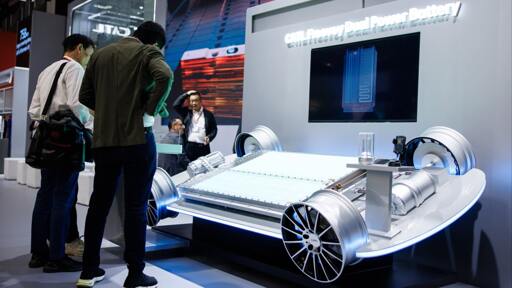cross-posted from: https://lemmy.zip/post/49214434
The world’s largest EV battery manufacturer has been rapidly expanding its share in the European market, which rose to 45 per cent from 37 per cent last year, according to JPMorgan.
Its global share was at 37 per cent in first seven months of the year, compared with 18 per cent for BYD, according to South Korea’s SNE Research.
The group also plans to bring its battery-swapping and recycling technology to Europe.
The Chinese group has invested more than €11bn in Europe, expanding its local manufacturing footprint in Germany and Hungary. It is also building a new plant with Stellantis in Spain, which is expected to start operations by the end of next year.
Shen said CATL was open to discussing joint ventures not only with other carmakers but also with battery makers such as France’s Automotive Cells Company, a joint venture between Stellantis, Mercedes-Benz and TotalEnergies.
In the US, where protectionism, anti-China sentiment and security concerns has led to an effective ban on new Chinese cleantech manufacturing, the group has instead licensed its battery manufacturing technology to Ford and Elon Musk’s Tesla.



CATL is the top recipient of Chinese state subsidies among all ~5,000 companies listed in mainland China, a clear sign of the Chinese party-state’s strategic focus on battery investments in general and CATL in particular. The company is obliged to collaborate with Beijing on all matters.
The government in Beijing and the Chinese Communist Party (CCP) use several approaches to secure this control and oversight of the business community. So-called ‘CCP cells’ have expanded greatly inside company headquarters. New rules in corporate governance - e.g., ‘golden shares’ held by the government - and party officials placed in the companies’ boards and commitees’ guarantee party’s role in business decisions. CATL has become a role model for the blurred lines between politics and private enterprises.
In the U.S., the company has been banned not long ago (before Trump became president), and CATL now wants to avoid the same in Europe.
CATL’s ‘willingness to help European startu-ps’ is now owed to Europe’s changing trade and tariff policies - and it doesn’t happen ‘despite’ but under full control by the Chinese government.
Every such deal with authoritarian countries is a ticking time bomb.
Just look at USSR’s car history - first they acquire licenses from FIAT to build their own cars in likeness of what FIAT had. And then after some time they show their thanks by selling their cars at lower prices that FIAT, thus dampening the price, while FIAT wasn’t really doing good financially.
Most fun part - Soviet citizens paid unreasonable prices for their cars simply to balance out expenses to dampen export variant prices (and those were of much higher quality too). Example - VAZ 2101 was costing almost 5700 rubles, which by “official” exchange rate (RUB:USD 1.2:1) would be around $6800, and for that you could buy Chevy Corvette Stingray in West.
This situation today is very different, but still has this smell of “buy this band-aid from us, it will be of great use later”.